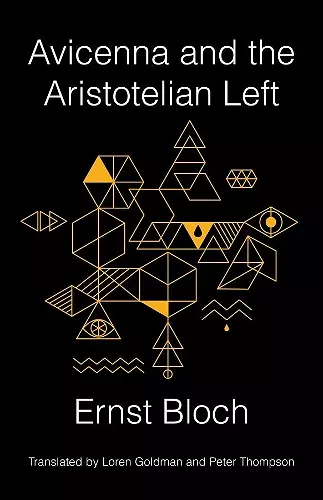Avicenna and the Aristotelian Left
Ernst Bloch author Peter Thompson translator Loren Goldman translator
Format:Paperback
Publisher:Columbia University Press
Published:26th Feb '19
Currently unavailable, and unfortunately no date known when it will be back

Ernst Bloch was one of the most significant twentieth-century German thinkers, yet he remains overshadowed by his Frankfurt School contemporaries. Known for his engagement with utopianism and religious thought, Bloch also wrote incisively about ontological questions. In his short masterpiece Avicenna and the Aristotelian Left, Bloch gives a striking account of materialism that traces emancipatory elements of modern thought to medieval Islamic philosophers’ encounter with Aristotle.
Bloch argues that the great medieval Islamic philosopher Avicenna (Ibn Sina) planted the seeds of a radical materialism still relevant for critical theory today. He contrasts Avicenna’s and Aquinas’s interpretations of Aristotle on form and matter to argue that Avicenna’s reading democratizes power and undermines clerical and political authority. Bloch explores Avicenna’s world and metaphysics in detail, showing how even his most recondite theoretical concerns prove capable of pointing toward radical social transformation. He blazes an original path through the history of ideas, including Averroes (Ibn Rushd), Spinoza, and Marx as well as lesser-known figures. Here translated into English for the first time, Avicenna and the Aristotelian Left is at once a succinct summation of Bloch’s own idiosyncratic materialism, a provocative reconstruction of the Western philosophical tradition in light of its exchanges with Islamic thought, and a vital resource for contemporary debates about materialism in critical theory.
Against the background of today's Islamophobia, Bloch's study is an extraordinary achievement. It demonstrates how one of the hidden origins of European modernity is Avicenna's interpretation of Aristotle. Islamic thought at the roots of our notions of freedom and emancipation? If you are shocked, read Bloch's book! It is only now, almost a century after its first publication, that the time for this book has arrived. -- Slavoj Žižek, author of Less Than Nothing and Absolute Recoil
In this beautiful and exciting essay, Ernst Bloch enables us to think differently, more alive, more openly and creatively, about matter and form by reading the history of metaphysics against the grain and across cultural divides. We get a taste of what real philosophy once was and what it might be again as the contours of world philosophy are beginning to emerge. Bloch’s irreducibly personal voice comes alive in this excellent translation. -- Johan Siebers, Director, Ernst Bloch Centre for German Thought, School of Advanced Study, University of London
Over the years, Ernst Bloch has enjoyed a reputation as the most intransigently utopian of the Western Marxists, a prophetic figure with great erudition and a capacious imagination. This accessible and graceful translation makes his important book on the medieval roots of vitalist materialism available to English speakers for the first time. -- Martin Jay, author of Reason after Its Eclipse: On Late Critical Theory
Avicenna and the Aristotelian Left is seminal for understanding the utopian theory and cosmological interpretation of nature provided by one of the great thinkers of the twentieth century: Ernst Bloch. Its linkage of two philosophical worlds is unique and it should refashion conventional views on materialism and the 'canon.' The translators deserve our gratitude for making available a difficult work whose boldness and cosmopolitan character will surely inspire the intellectuals of our own time. -- Stephen Eric Bronner, author of Modernism at the Barricades: Aesthetics, Politics, Utopia
Avicenna and the Aristotelian Left, by Ernst Bloch, one of the most significant German philosophers of the twentieth-century, traces an alternative genealogy of materialism based on the identification of an important line of counter-interpretation of Aristotle’s ideas on form and matter. While the history of modern thought has been conventionally interpreted as a deliberate rejection of the Aristotelian tradition in science and philosophy, in this book Bloch introduces the surprising thesis of a connection between Aristotle and the Enlightenment. -- Humberto Beck, Kilachand Honors College, Boston University
Bloch’s essay is engaging and erudite, bringing to light the philosophical heritage of twenty-first century new materialism... -- Steph Marston * Marx & Philosophy Society *
Sheds light on the Muslim philosopher doctor’s contribution to a unified discipline of philosophy and science. * Arab Studies Quarterly *
ISBN: 9780231175357
Dimensions: unknown
Weight: unknown
144 pages